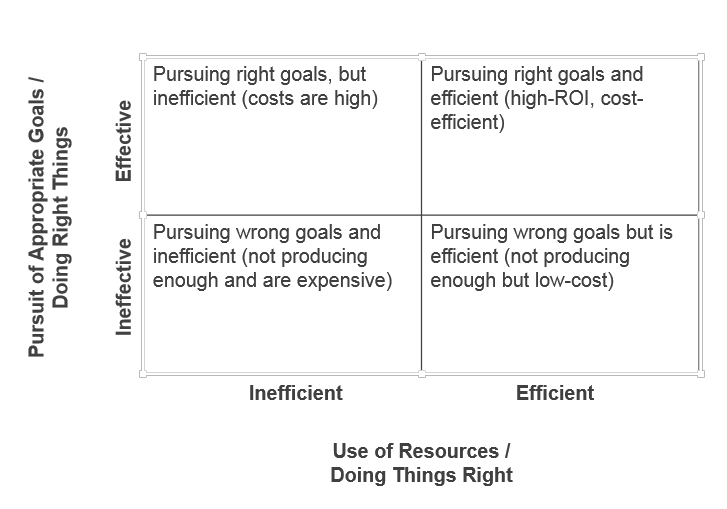Efficiency vs Effectiveness Explained
What is the difference between effectiveness and efficiency? They are two buzzwords that are popularly used by CEOs and Sales VPs in charting the course of their organizations. Yet, they are also commonly misused and misinterpreted, not just in the lexicon of business-speak but also in daily use. Let us begin by defining efficiency and effectiveness in general terms, borrowing from Dictionary.com:
Effective (adj.) – Adequate to accomplish a purpose; producing the intended or expected result.
Efficient (adj.) – Performing or functioning in the best possible manner with the least waste of time and effort.
The difference between effectiveness and efficiency can be summed up shortly, sweetly and succinctly – Being effective is about doing the right things, while being efficient is about doing things right.
Learn How To Measure The Effectiveness And Efficiency Of Your Sales PROCESS
Another way to illustrate efficiency vs. effectiveness is with the 2×2 grid below. By referring to this chart, CEOs and sales leaders can find an optimal balance between effectiveness and efficiency:

Companies usually seek to increase and improve the efficiency of their operations and sales processes. After all, when working with limited resources, they would prefer to maximize the use of each of these resources, from budget and technology to time and sales reps. However, by pursuing efficiency at all costs (irony intended), some of these companies are missing a valuable chance to take a step back and look at their overall effectiveness from a big picture perspective.
The best situation for every company is to always pursue the top right box – pursuing the right goals and being efficient, by making use of technological advances, not wasting time, and having better alignment and collaboration between employees. Many companies have their hearts in the right place – they know what goals they want to achieve, but are inefficient in achieving those goals. Other companies are tightly run ships, with all employees working together, humming along and all singularly focused on the task at hand…but what if the task at hand is the wrong goal?
An Example
For a practical example, consider the differences between activity effectiveness and activity efficiency among your sales reps., every sales team has daily, weekly, monthly and quarterly goals that, when achieved, are representative of the effectiveness of their roles. If your reps are tasked with making 70 calls each day, and they easily hit their numbers, they are effective at their jobs. Some might even go above and beyond and make 80 or 90 calls each day. But what if those dials are producing few connects and even fewer deals?
That’s where activity efficiency ratios come in. For a sales manager, having reports that track how many calls lead to connects, how many connects lead to demos and how many demos lead to deals can be an incredibly powerful indicator of which of your reps are not only effective at their jobs but efficient in performing them.
And therein lies the rub – is it more important for your organization to pursue effectiveness or efficiency? If you’re trying to grow aggressively and have resources to burn, optimizing effectiveness might be the way to go. However, if a smaller company has very limited resources to work with, they might be more interested in pursuing efficient operations in order to maximize their capabilities and not stretch themselves too thin. Finding the sweet spot between effectiveness and efficiency is truly that ultimate goal for all companies.
While Quality management system standards mandatory require that all organization processes have to be effective (have KPIs for process output), NVT auditors are trained to encourage organizations to work towards having processes efficient (have KPIs for processes operations).
